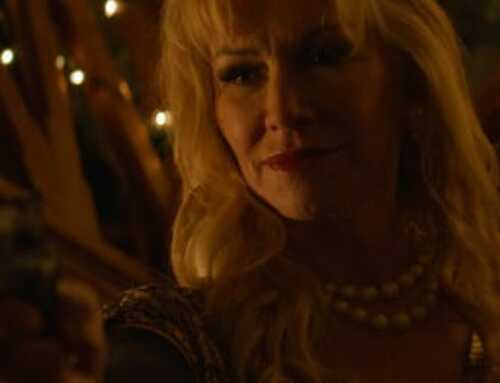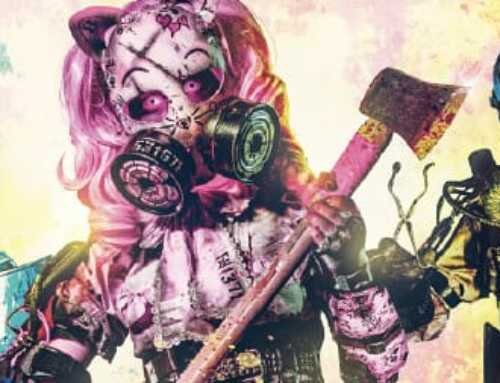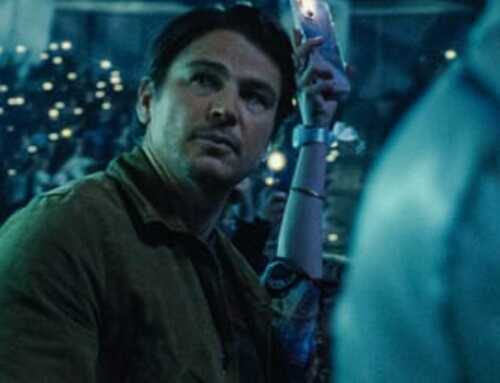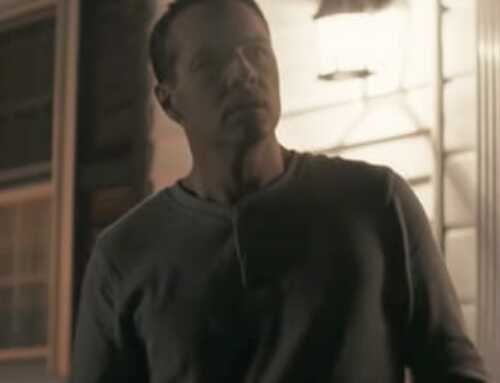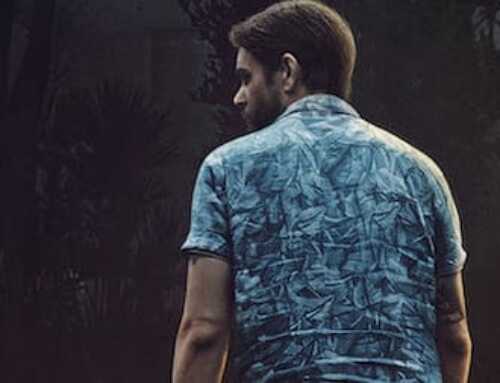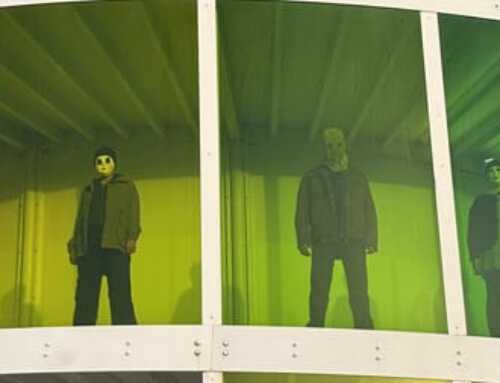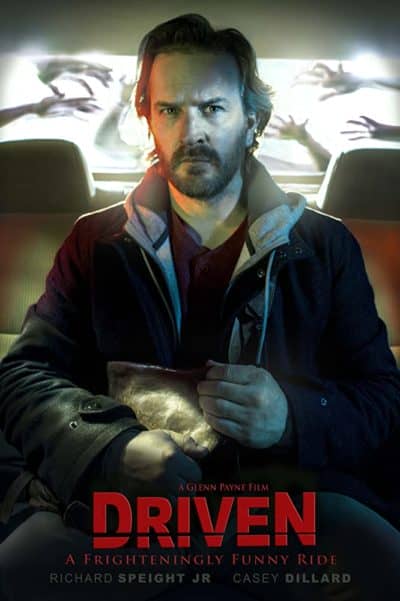 I received a call from Glenn Payne and Casey Dillard, the director and writer-star of Driven (respectively). They were both on a speakerphone. We discussed their film, but on the way explored work experience, freezing cold, improv, and failure.
I received a call from Glenn Payne and Casey Dillard, the director and writer-star of Driven (respectively). They were both on a speakerphone. We discussed their film, but on the way explored work experience, freezing cold, improv, and failure.
Scix Maddix: Well, let’s talk about Driven! Actually, since you’re both there in the same room is it safe to say that you guys know each other outside of the show?
Glenn Payne: Yeah, we do, definitely.
Casey Dillard: We’ve been working together in different arenas for about 10 years–
Glenn: Over ten years.
Casey: Eleven, something like that?
Glenn: Yeah. We’re actually in two improv comedy groups together. That’s how we met and I’d been doing films a little while before that and we started working together and have been annoying each other ever since.
Scix: Well that segues into one of the things I wanted to ask you about: I noticed improv showing up on your IMDB page. How, how much of Driven was improvised, if any?
Casey: Maybe 2%. I love improv. And I love movies. But I don’t necessarily like mixing them very frequently.
Glenn: Yes, it’s very challenging to make that work at the same time. Not impossible, but–
Casey: Done really well, it’s really good. Like I do enjoy the Christopher Guest movies and things like that, but a lot of times it results in the long rambling scenes that don’t go anywhere.
Glenn: Yeah. And that could have to do with whether or not the actors are actually improvisers trained in improv. Maybe they’re not so much, maybe.
Scix: Where in the world are you guys right now?
Casey: At this moment we are in Blue Springs Mississippi, which is where Glenn lives. I live in Tupelo, which is a just a few minutes away.
Glenn: Yeah, pretty close, which is where we actually filmed.
Scix: Casey, again, I’ve been trolling your IMDb pages. I see a lot of shorts in your writing credits. Am I correct in that this is your first feature length?
Casey: That was my first feature script Yes.
Scix: Aside from obviously length, how is writing for a feature length film different from from writing all these shorts?
Casey: It eats up a lot more of your energy. And to be honest, it’s tricky like a lot of things. I assumed would be like comparing a 5K to 100 yard dash, but that’s not even accurate. It’s basically like a short jog versus a much, much longer one. Whatever energy and tension that you establish, you just have to maintain it for that much longer and keep the plot moving forward. You can’t just fill it up with filler dialogue, things have to be happening the whole time.
Scix: And I believe I actually even mentioned this in the review: you did that well, things are happening all the time. Nothing felt like dead space.
Casey: I appreciate that.
Scix: Do you find it challenging, performing in something that you yourself have written? Did you come across moments where you second guessed your scripts?
Casey: I usually start second guessing my script when I actually watch the movie. That’s when you see it all together. In a lot of ways, it’s much easier because I can go directly to the source if I’m trying to figure out where a character is coming from or what they’re dealing with at any given moment. And obviously memorization is much easier if it’s something that you’ve written and rewritten. But if I have an issue with it, it’s being too attached to the way that I see things in my head. And then if someone else is like, “Oh, I thought it sort of like this in tone,” I have to take a minute, take a step back and be like: “That’s right. Other people are allowed to have input on that, and not just me.”
Scix: So Glenn, did you wind up overriding Casey from time to time?
Glenn: Every chance I got. (Laughs) We’re creative, we’re around each other a lot. So obviously we have plenty of times where we don’t agree on something and we butt heads. And we’re really good about figuring it out what’s best or compromising or giving and taking. I mean we’ve obviously had things where we took a while to come to a conclusion. But I don’t know if we’ve ever had a singular thing where one of us didn’t decide the other might have been at least slightly more right about whatever it was. The point being, I really enjoy working closely with the writer. I will go to her quite often, to make sure I have things right. And I might have an idea, and maybe in the end we do tweak it and change it to what I was thinking for whatever reason, but I always want to know the original intent, make sure I’m not wrong out of the gate for how I’m seeing something.
Casey: He wants to know exactly what he’s overriding.
Glenn: Yeah.
Scix: Well that seems wise. One of the interesting things about Driven is that it’s almost entirely in or right next to the car. So it’s like a single room play almost. Did you write it that way or was that something that came out in the directorial choices?
Casey: I did write it that way. It all was Glenn’s concept originally to make a movie that took place entirely in one vehicle. And so we both had ideas and I think we both wrote a ten-page sample script. But it feels to me like you said it is like a one room play, and my background is actually in theater. So like a little bottle episode without a lot of changes and everything, that’s definitely up my alley. That being said, I think that our impression was that this was going to be easy because we were on one location, but the problem is that our location had to go to a lot of other locations.
Glenn: Yeah.
Casey: And so it ended up being actually very time intensive and difficult for that reason.
Glenn: More like 25 locations.
Casey: Right. We were dumb.
Glenn: So that part didn’t quite add up. And it’s interesting, every once in a while you’ll see different reviewers and people talking about the movie and I’ve heard a few people say, “Oh they must have chosen the car element because that was somehow easier or even less expensive.” I would disagree with that completely. I would say no, that is the opposite, it’s much easier to build several buildings or various locations. It was a really interesting challenge. That I enjoyed.
Scix: And a car isn’t like a set where to get a shot you can move a wall out of the way either. It kind of limits your your your camera options, doesn’t it?
Glenn: Yeah, most definitely. So we have to be really careful about that. I ended up storyboarding the whole movie in advance, just because you shoot out of order all the time, so I wanted to make sure we didn’t repeat shots where we shouldn’t, that makes it less interesting visually. So I tried to max out the different angles, but always with the focus towards the emotion of the scene or what’s happening with Casey and Richard’s characters there, so hopefully that comes across in the film.
Scix: Is there any thought of writing something else in this universe one day?
Casey: We’ll see. I think a few people have asked about a sequel, and Glenn’s stance is “Maybe” and mine’s “No.”
Glenn: Yeah, we’re torn about that
Casey: I have made reference to the fact that I really, really liked the whole team that we worked with and everything. And I would love to make another movie with the exact group of people. But, but probably something closer to Edgar Wright’s Cornetto Trilogy than the Marvel Cinematic Universe.
Glenn: Everyone’d have new roles.
Casey: Yeah.
Glenn: I guess I could see a sequel being fun but they’d have to get out of the car. And that could be our new tag line: “Time to get out.” Have the car crash immediately, that’d be cool and they get out.
Casey: You can’t see me, but I’m thumbs down right now.
Scix: Some world-building thought was put into it, is the main reason I asked. I love the idea of an ensemble cast like the Cornetto Trilogy or the Christopher Guest movies. I think that sounds a lot of fun. You have my vote.
Casey: There is definitely a lot of world building that went into it. Like, I guess I would be somewhat interested in a prequel or a “midquel”, but I actually don’t want to write that. But I would I would come closer to being interested in that than a sequel.
Casey: That kind of thing, yes. We talked, both Glenn and I and Rich and I about the fact that there is a whole movie that takes place before this whatever starts. Roger is having to learn about all of these things and making decisions to end the curse and things like that.
Glenn: You could have somebody else make it, and you get to watch it. Is that what you’re saying?
Casey: Yeah.
Glenn: In his massive house with a fake family.
Casey: I think it’s a really nice condo, in New York.
Glenn: Really?
Casey: Yeah. But he owns, he doesn’t rent.
Scix: Can I can I get this clarification: you said a prequel or a what?
Casey: A “midquel” — something that’s happening alongside.
Glenn: I didn’t want to admit it but I have never heard that term before either.
Casey: I probably made it up, but I’m sure I’ve heard someone say it. Maybe it was me.
Scix: Well, let’s run with it, now it’s a thing. Officially, it’s gonna be in print.
Casey: Perfect.
Scix: So, Casey, a question about your your writing process. I don’t know if you know the terms, are you a “plotter” or a “pantser”? You know the term?
Casey: I don’t, educate me!
Scix: A plotter kind of plots everything out and does an outline and knows where it’s going to go at the end, and the pantser writes by the seat of her pants.
Casey: Oh!
Glenn: Oh!
Casey: I like that, did you make that up?
Scix: No.
Casey: Okay.Well, I hadn’t heard it before, so in my mind, you did.
Scix: Okay.
Casey: I would say, a loose plotter, who keeps her pants nearby.
[all laugh]Casey: I have a very loose beginning, middle and end in mind when I start writing I would say. With Driven I probably had less plot in mind when I started than I typically do. But that being said, I have specific scenes planned out really well in advance, and I just sort of see where they land. I’m probably closer to the pantsers.
Scix: Let me circle back a little bit to the improv thing: do you find your improv experience helps with your non-improv acting?
Casey: Absolutely. Would you agree with that?
Glenn: Yeah, definitely, yeah. You exercise so many muscles, and do different characters in a very short amount of time.
Casey: And like I said you know whenever you start to do a scene with your scene partner, be it the director or your on-screen partner at any point in time, they might bring something new. They want to see a different way than what you envisioned and you really have to be ready to change that, and be used to being able to switch gears and adjust on the fly. It makes it much, much easier. And I think improv just can make you more of a team player, which everyone needs.
Scix: I’m definitely going to link this interview to my improv group here in Salt Lake City.
Glenn: Oh, you’re so you’re in a group?
Scix: Yes.
Glenn: That’s awesome, how long have you been doing that?
Scix: Well I’ve been in this group for about two years, I’ve been doing improv since 1986.
Glenn: Oh, that’s wonderful!
Casey: That’s awesome!
Glenn: Yeah.
Casey: What is the name of your group that you’re in now?
Scix: The Hot Toddy Improv Workout
Casey: All right!
Scix: Improv groups need silly names.
Glenn: Yeah. I like it!
Scix: Okay, and really the final main point I wanted to make sure I had a chance to hit on. This is a particular focus of me and the movies I tend to review: I happen to notice that some LGBT representation going on in here.
Casey: Right.
Scix: I guess I’m not even sure I have an attached question to that, but thank you and good job. I love seeing that, when it’s not central to the story, it’s just the character representation.
Casey: Yeah, I’m glad that you enjoyed that. That’s one thing that people told me a lot over the course of this, that they appreciated it. It was, you know, just the character. She is in the LGBT community, and there are some references to some of the issues running through and that, but at the end of the day, it’s just one of her character traits.
Glenn: Yeah.
Casey: It’s not the only one. In a lot of movies when you get into talk about representation, which is important and obviously, we need a lot more of it, people think that if you want to include a gay character or a bi character or trans, pan, whatever they happen to be, that has to be what they’re about what the story has to be about. And so maybe they’re thinking “We’d love to include more representation but that’s not my story and I don’t feel comfortable telling that exact story.” But that doesn’t have to be the only story that you tell.
Scix: Right.
Casey: And I just feel like it’s normalized, filling roles that we normally see filled only by straight characters or characters that we only see in straight relationships, that straight situation, then you know it’s just better for everybody. Everybody deserves to see themselves in a story at some point in time.
Scix: Yeah, and I love that she’s really well-rounded for the little we see of her. She does stand up, and just by being a driver for — Ferry is it? — that says something about her character and place in life as well. Have either of you driven for a gig driving job? Because that that seems very realistic, her early customers.
Casey: I have not. I did used to give rides to drunk people back in my very early improv days, so some of that was my experience. And I do have some friends who’ve driven for official taxi companies and rideshare companies. And so I harvest their stories. Like I did have a friend of mine who told me about a group of gals out partying, and they were trying to hand him the phone and get him to take a photo of them while he was driving. He’s like, “No, I don’t think that’s a good idea. We’ll do it when we get stopped.”
Scix: It felt very believable. I’ve never been a driver, but I’ve definitely been in service jobs and yeah, that opening sequence felt very very believable.
Glenn: I have as well, and Casey is the writer and we both know retail and restaurants. It translates.
Casey: I think it’s pretty universal. In a lot of ways.
Glenn: The things people do.
Casey: Yeah.
Scix: And it is mandatory for actors to work in food service at some point, waiting, isn’t it? Isn’t that the law?
Casey: I mean, I would say yes, but if it’s not it should be.
Glenn: Everyone should have to.
Casey: Yeah. Because if they make it someday they should know that they need to tip lavishly.
Scix: Yeah! And finally, what would you like people to know about Driven that I haven’t thought to ask you yet?
Glenn: For me, I hope that when people watch it I really want them to have –pun not necessarily intended– a fun ride, a fun adventure that you can watch and enjoy. And it dips its toe in a lot of different genres, so you get a lot of different things people might enjoy, so that when you get done with it at the end of the day you maybe shared some laughs with the characters, some thrills. You know, I don’t know if there’s tears or anything like that. But I want you to enjoy your ride when you watch it. I hope that’s what people get out of it.
Casey: What I hope that people take away from it is that you can fail in the short term and still succeed in the long run. Failure and setbacks don’t have to define you, they’re just part of the trip.
Scix: Failure as a comic and failure as a hunter of demons, for want of a better word.
Casey: Exactly! And I’d like everyone to know that we talk a lot about how cold it was on set, but we’re not exaggerating.
Glenn: It was very cold.
Casey: It really was that cold. And I just think it’s really important people know that.
Glenn: Casey and Richard both, as well as everybody else that was in the film did a great job, moving their faces and their lips, given that it got down to like, maybe 5 degrees with the wind chill and we almost froze to death but–
Casey: I’ll also say it probably didn’t get Utah cold, but it got pretty cold.
Glenn: Yeah.
Scix: Excellent. All right, well thank you for talking to me. I will be watching both of you to see if you pull out another ensemble film, a Christopher Guest film or something like that in the future.
Casey: Thanks for watching and reviewing. I love your review from last year or whenever that came out. I appreciated it a lot.
Scix: Thank you. All right, I’m gonna set you free now.
Casey: All right. You have a great afternoon!
Scix: Thank you, you too.
| DRIVEN | ||
| RATING: | R | |
| Runtime: | 90 Mins. | |
| Directed By: |
Glenn Payne
|
|
| Written By: |
Casey Dillard
|
|


